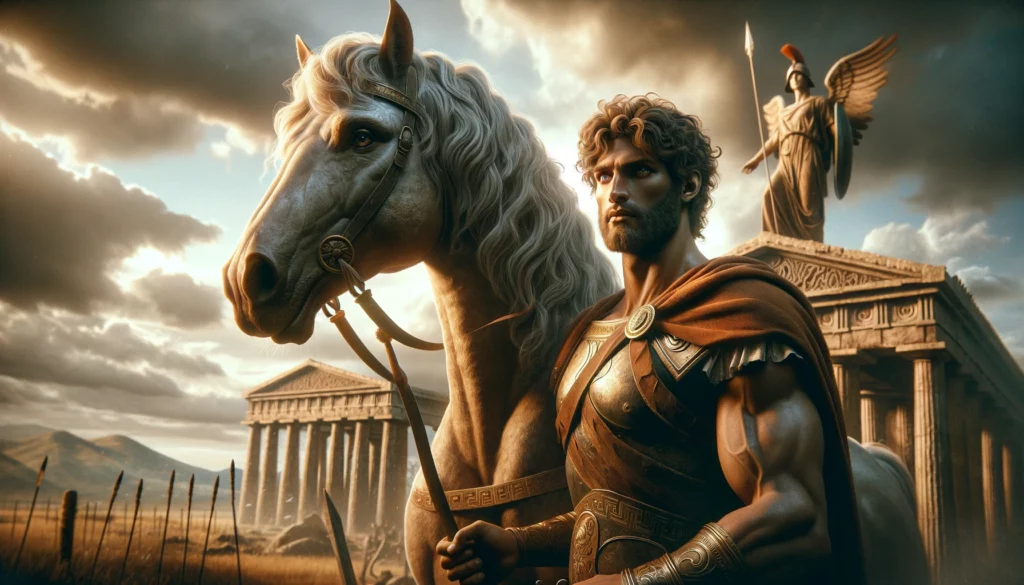God of Horsemanship – Twin of Pollux, with whom they form the Dioscuri
Castor is the twin brother of Polydeuces (Pollux in Latin), a pair of demigods. The two in collective are known as the Dioscuri. The twins feature in a number of myths, crossing paths with other notable figures in Greek Mythology like Jason. A major theme in stories featuring these twins, is the idea that Castor is a mortal, while Polydeuces is immortal. This is due to the fact that while they share a mother, the father of Castor is a mortal while Polydeuces’s father is Zeus.

Origin of Castor
The origin story of Castor and Polydeuces starts with their mother, Leda. Leda, the daughter of an Aetolian king, was married to a Spartan king, Tyndareus. However, Leda attracted the attentions of Zeus, who appeared in the form of a swan to mate with her.
According to the myth, the twins were hatched from an egg, along with their twin siblings Helen and Clytemnestra.
Despite the fact that Castor and Pollux were twins, they were also only half-brothers. Pollux was the product of Zeus and Leda while Castor was sired by Tyndareus and Leda. As a result, Pollux was immortal while his twin was mortal and able to die.
While the mixed mortal/immortal nature of Castor and Pollux is a theme of many myths, it’s not universal. There are some stories in which both Castor and Pollux are mortal. For instance, in the Illiad Helen of Troy wonders why her brothers Castor and Polydeuces are not among the sieging forces. The answer is that they had both died previously.
Myths Involving Castor
When the Dioscuri twins grew up, they lived lives full of adventure and battle, catalogued in a number of myths.
The Calydonian Boar
The Calydonian Boar was a ferocious creature. Summoned by the Hunter goddess Artemis to plague the Calydonian region after its king showed her disrespect in his offerings.
A group of some of the greatest heroes of the land assembled to hunt the boar. Among them Castor and Pollux. The lone woman hunter, Atalanta, draws first blood on the boar, causing controversy among some of the heroes unaccepting of a woman among their ranks.
Castor as an Argonaut
Castor and Polydeuces sailed as crew members of the famous ship the Argo, captained by the mythical hero Jason. Jason’s quest was to find the Golden Fleece, a prize which would grant Jason kingship of the kingdom of Iolcus. Among the heroes sailing with the Argo were legends such as Heracles, Orpheus and Theseus.
On their quest for the Golden Fleece, the Argonauts encounter a number of supernatural battles and dangers, as well as dealings with diverse peoples as they sail toward their prize. In the end, Jason finds the Golden Fleece and returns triumphant.
The Death of Castor
One of the most famous myths involving the twins, deals with Castor’s death. In this story, Castor and Pollux steal a herd of cattle with their cousins, Idas and Lynceus. After successfully stealing the cattle, Idas tricks the brothers into having an eating contest, the winner of which gets all the cattle. Idas, who is gigantic, wins the contest and takes all the cattle.
Castor and Polydeuces plot their revenge, and finally get a chance to steal Idas and Lynceus’ herd of cattle while a feast is going on. As the two are stealing the cattle, Idas and Lynceus happen upon them, and Castor is killed in the ensuing battle. Polydeuces kills Lynceus, and Zeus strikes down Idas with a thunderbolt to save his son Polydeuces.
Zeus gives the immortal Polydeuces a choice: Either he can spend all his time in Olympus with the immortals, or he can give half of his immortality to Castor. Polydeuces chooses to share his immortality with his twin, and they alternate between the Underworld and Olympus.
The brightest stars in the Gemini constellation are named after Castor and Polydeuces, for their bond as twins.
Castor Facts Summarized
- Twin Dynamics: Unlike his brother Pollux, he was known for his skill in horse taming and chariot racing, highlighting the distinct talents within the Dioscuri duo.
- Mortal Heritage: Castor’s mortality, in contrast to Pollux’s immortality, presents a unique narrative of brotherly love that transcends the divide between the mortal and divine realms.
- Constellation Legacy: The Gemini constellation, representing Castor and Pollux, symbolizes their inseparable bond, marking their presence in both the night sky and mythology.
- Patron of Sailors: The Dioscuri twins were revered as protectors of sailors, often invoked during storms for safe passage.
- Athletic Celebrations: Castor and Pollux were honored at the Spartan festival of the Dioscuria, which included athletic and martial competitions celebrating their heroism.
- Worship Sites: Temples dedicated to the Dioscuri were established in ancient cities, serving as places of worship and communal gathering.
- Iconography: In art, Castor is often depicted with distinctive symbols such as the pilos (a type of helmet) and spears, identifying him as a warrior.
- Cultural Influence: The tale of the Dioscuri has inspired various cultural works, from classical literature to modern media.
Link/cite this page
If you use any of the content on this page in your own work, please use the code below to cite this page as the source of the content.
Link will appear as Castor: https://greekgodsandgoddesses.net - Greek Gods & Goddesses, June 11, 2018